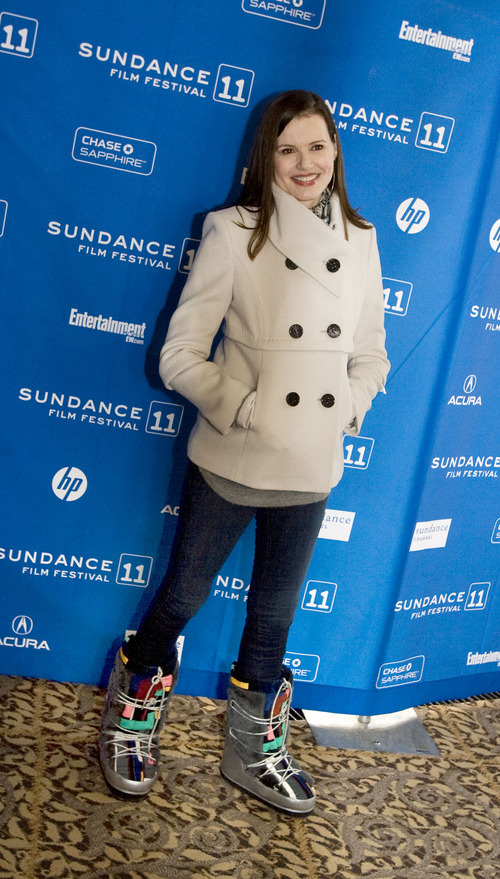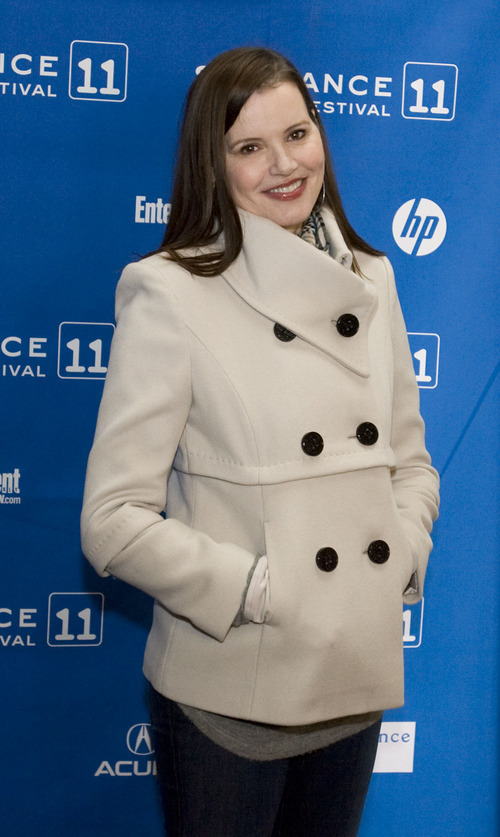This is an archived article that was published on sltrib.com in 2011, and information in the article may be outdated. It is provided only for personal research purposes and may not be reprinted.
The life and career of Geena Davis shifted mightily in 1991 when her film "Thelma and Louise" hit the screens.
Davis and co-star Susan Sarandon were nominated for best actress honors and Davis became an A-list performer who could pick and choose roles. They lost in Academy Awards balloting to Jodie Foster for "Silence of the Lambs," but the film's success became a major turning point, steering Davis into another direction in addition to acting.
Davis became an outspoken advocate for getting more women's roles in films and, in 2006, she created an organization through the University of Southern California – the Geena Davis Institute on Gender in Media.
It is in that latter role that Davis will visit Salt Lake City Wednesday as keynote headliner at the Smart Women Smart Money conference presented by the Women's Financial Group of Zions Bank. According to a Zions statement, Davis will encourage women to "get behind the wheel of their financial futures."
Speakers include Christy Brown and Dave Ramsey who will discuss how to use money wisely, how to budget, will power and money-making mistakes. Also speaking will be Suzie Jones, executive vice president of Amegy Bank of Texas and an expert in financial planning, retirement-plan design and investments.
A series of micro grants totaling $18,000 will be presented to Utah women who applied for help with business start-ups and expansion, as well as other community ventures.
The free conference runs from 8 a.m. to 3 p.m. in the Salt Palace Ballroom in Salt Lake City. Required advance registration can be made at http://www.smartwomen.zionsbank.com.
At 7 p.m., Davis will celebrate the 20th anniversary of "Thelma and Louise" during a Zions-sponsored "An Evening with Geena Davis" for the Salt Lake City Film Center. Utah Office of Tourism Managing Director Leigh Von der Esch will conduct an interview with the actor at the Rose Wagner Performing Arts Center.
Davis, in a telephone interview, said no one involved in making "Thelma and Louise" knew the film was "going the hit the nerve" it did.
"The reaction of women was so striking it made me realize how few opportunities we give women to experience excitement and inspiration from female characters in movies," she said.
"It really was for me a big lesson in the power of media images. It definitely colored my choices [of film roles] after that.
"I have been mindful of the women in the audience seeing the character I chose," Davis said.
After her movie "A League of Their Own," she said critics predicted its success meant there would be a wave of women-sports films to follow.
"There were none. That was an interesting lesson as well: how difficult it is for female movies to gather momentum."
Davis quickly points out that there have been, over the past two decades, many films with strong roles for leading women actors. What she wants to change within the Hollywood culture with her Institute on Gender in Media is to get more women onto the big screen in a variety of large and small roles.
"The percentage of female characters in movies has been the same since 1946: three men and one female," she said, citing her institute's research.
"When we thought things are changing, there haven't been any positive results. Our goal is not to push for more female-driven movies.
"Make the movie you're going to make, but add female characters," she said she tells screenwriters and producers.
Other organizations also work to create opportunities for women filmmakers.
For example, Los Angeles-based Women in Film's website said it "recognizes the importance of developing pathways and opportunities to encourage current and future generations of women to explore and pursue careers in all fields of the entertainment industry."
It does this, it said, by assisting independent filmmakers, funding programs that provide scholarships and internships, and through public-service announcements that spotlight issues important to women.
Davis created her institute as a research-based nonprofit headquartered at USC's Annenberg School for Communication & Journalism. It brings the results of gender and media studies directly to studios, networks and content providers.
"People were absolutely stunned, were shocked even," she said. "My theory about why they didn't know this [the seemingly unshakable 3-to-1 ratio] is that's all any of us saw as we were growing up.
"We've only seen far more male characters than female characters. … If there are only one or two female characters in a movie, you don't notice that; it looks normal."
She said her work is getting results.
"The fact that I'm in the industry and have access … [means] I am able to have some influence. In almost every meeting we have, someone will tell us they are going to change their project, take a look at their slate, and where they can add [female] characters, they will.
"When we update the research in 2016, we'll be able to see if the needle has moved." For more information
P The free Smart Women Smart Money conference is 8 a.m.-3 p.m. Wednesday at the Calvin L. Rampton Salt Palace Ballroom. To register go to http://www.smartwomen.zionsbank.com, or call 800-737-6586.
For the Geena Davis Institute on Gender in Media, go to http://www.thegeenadavisinstitute.org/.
For the SLC Film Center program, go to utahfilmcenter.org. Tickets for the Wednesday evening event are $50, or $42.50 for Film Center members, and are available through ArtTix.





